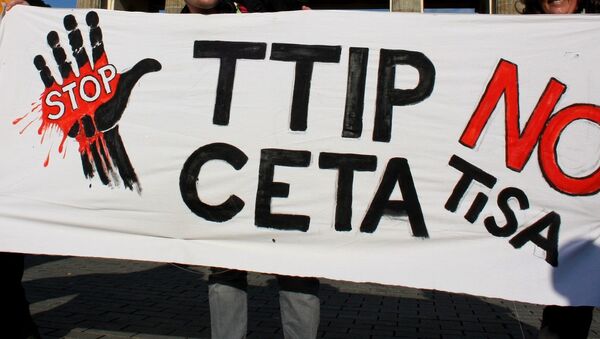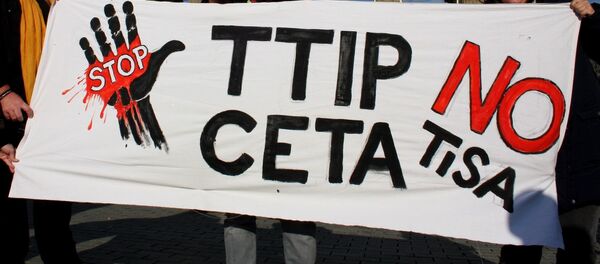"What a lot of the texts that have been leaked show about TiSA is that it is actually about removing the restrictions on multinationals to set up shop in countries, and it attempts to restrict the ability of governments to regulate these service providers," Daniel Bertossa said.
The director for policy and governance at the 20-million member, 154-country Public Services International (PSI) reiterated widespread concerns over the trade pact’s secretive negotiations.
TiSA is a trade agreement negotiated by 24 members of the World Trade Organization (WHO), including the European Union and the United States. The so-called toxic deal is widely criticized for bypassing WTO multilateral format for international trade regulations. The secretive treaty omits the BRICS developing economies of Brazil, Russia, India, China and South Africa.
Bertossa stressed on the sidelines of the WTO Public Forum that parties to the TiSA trade agreement hold some 70 percent of services production.
"It is fully in the interests of foreign providers," he maintained.
TiSA Negotiators Choose Secrecy Fearing Public Disapproval
Governments negotiating TiSA have opted to hold the talks in strict secret because they know that the public would never approve the content of the deal, Bertossa told Sputnik.
“The reason that they [talks] need to be secret is, as the USTR [US Trade Representative] and others put it, because if these negotiations were open, then it would be very hard to conclude them. It is really the admission that if the governments told us what they are doing then the people would not allow them to continue,” Daniel Bertossa said.
Bertossa described as "ironic" the US trade representative’s argument in favor of holding the negotiations on TiSA and other treaties in secret.
"It is really the admission that if the governments told us what they are doing, then the people would not allow them to continue. So there is an irony in their answer," he noted.
He added that TiSA is not a commercial treaty, but an agreement between states, therefore, the citizens of the countries involved are entitled to know the details of the accord being discussed by their political representatives.
Negotiations over TiSA, along with the US-EU Trans-Atlantic Trade and Investment Partnership (TTIP) and US-Pacific Rim Trans-Pacific Partnership (TPP), are shrouded in unusual secrecy. Those who have seen portions of the closely guarded text contend that the pacts enable multinational corporations to prevent sovereign governments from implementing national and international law.
Opponents of the wide-ranging deals fear they will allow corporations to take countries to court and predominantly serve the interests of US-based multinational corporations.
The draft text of the "toxic" TiSA contains competition policies that have not been agreed on by all 24 of the deal's negotiating parties, Bertossa told Sputnik.
"Some of the annexes actually try to introduce forms of competition policy that have not been agreed by many of the participating countries," Daniel Bertossa said.



